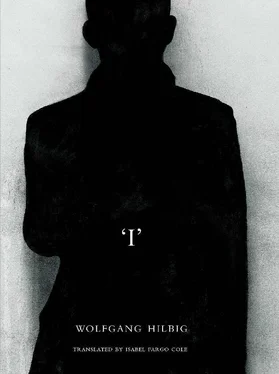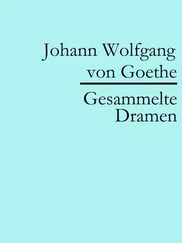Subsequent to such chance meetings he could never swear to their actually having occurred. . Why is that? he asked himself. — Because no one asks me who I meet any more! he replied. — In point of fact, the gentleman he called the boss hardly ever asked now what happened to him on a daily basis. . Literature! — the only topic the gentleman cared about was literature. — And so for me all things in this life were mere figments of the imagination, he said to himself later. And they were imagined as vividly as though he’d had to furnish evidence of his existence for this time period. . as though someday someone would come and ask: Do you have any evidence for this time?
One or two years later he’d conceived the notion that during his sleep phase an unconquerable distrust towards every reality had been instilled in him. . or had he instilled it in himself? It was a profound distrust of all perceptions and at the same time of his memory which stored these perceptions; and all the things he later believed to be anchored in his memory were either ones that had withstood a thousand doubts as to their existence, or they were pure figments. . and that, he thought later, was as it should be.
Soon after the shops closed, town life had already clustered in the few lit rooms behind windows not sealed off by blinds or heavy shutters. Mostly houses with front gardens; it was there alone (apart from the activity inside the pubs) that human life still stirred. The light that spilt out soon faded in the fog, the shadow of the bushes in the front yard left you utterly invisible, even if you ventured up close to the window. — Most of W.’s perceptions were acquired by looking from outside into the interior of lighted dwellings; what he saw was filtered through double panes and veiling curtains. . while he, outside, was in a different atmosphere, the fog-swirled atmosphere of the dark where all movement within the living rooms’ inward light seemed unreal to him, shoddy fictions. He didn’t understand the words that were spoken in there; when not completely inaudible they assumed an utterly different meaning in the glow of the light bulbs, the violet phosphorescence of the television screens. . no, of these utterances’ meaning he knew nothing, he sought their probable sense in the gestures meant to underline the words, he sought to follow the movement of the speakers’ lips and read off syllables, finally he began imitating the interplay of the lips’ forms to get at the words, the phrases. . without knowing, of course, how they were received, these sounds, by those who showed him only the backs of their heads. He almost played the role of a person trying to follow the conversation of deaf-mutes. . no, his role was that of a deaf-mute, tracking down the secret of those adept at speech. Rarely did he succeed in deciphering a serviceable sentence, or at least a few intelligible words. . only one single fact could be assumed with certainty: if more than one person was present behind the window, the capacity for speech was exercised at least once each evening. — It was a capacity from which he was cut off, now that he had taken his place in the darkness outside the windows. — He had no recourse but to replace the unheard words from inside the rooms with ones from inside his head.
Initially, of course, he’d tried to make out what was actually said. . as he later found, one could very well agree that what was actually said didn’t matter at all. What was actually said tended to be buried under one or more layers of banal drivel anyway. Didn’t this suggest that the essential thing was to know the completely trivial statements people made? You had to follow the everyday, interchangeable conversations, the mindless gibberish, the offhanded routines, to be able to reflect on the mood of the people. . in fact, maybe you had to practically ignore the so-called substantive statements, which might merely be repeating the word supply from TV broadcasts or printed paper, at best reversing its meaning; in other words, these statements were worthless! — The people’s other speech supply, the banal, interchangeable talk, which could just as well be made up. . if you had an expert to do it. Probably you’d have to check now and then whether it changed over the years. . which was improbable: in his experience it stayed the same from the time people learnt to talk to the time of their death.
But the business retained an attraction for him, a strong attraction even; it lay in his voyeuristic behaviour. . and in the non-gratification which a voyeur’s behaviour yielded. The non-gratification kept his craving alive, it was the motor of his unrest, driving him out into the fog each evening. What those mouths formed in there was completely irrelevant — and had it been sheer conspiracy, had these rooms hatched demonstrations or terrorist attacks, it would have interested him only marginally (and he might even have kept it to himself!). . at some point the acoustic aspect of the conversations he observed ceased to matter to him; the organs of speech which he palpated with his eyes suddenly had the character of body parts in the so-called private area. And from that moment on he increasingly succumbed to the impression that these wonders, these lips, these tongues and teeth, these throats, these moistly gleaming, secretion-filled maws were forming unknown and inconceivable obscenities. . the attraction lay for him in the attribute inconceivable .
He would have dearly liked some sort of device, a kind of hearing aid; a curved old-fashioned horn, an ear trumpet from a past century might have been just the thing for him. Of course the boss could have offered him a better tool. . but he told himself that an instrument would only lull back to sleep the senses which he felt had now reached an extraordinary degree of development. Besides, he feared the boss would immediately envisage some sort of practical benefit from his skills. . even without an ear trumpet he had learnt over time to divine some of what was spoken or yelled behind the windowpanes (in the outlying houses there seemed to be more yelling than speaking. . conclusions could have been drawn from that). Doggedly he had learnt to interpret gestures, facial shifts suddenly led him to extrapolate the state of the country’s economy — the only reason this didn’t bore him to death was that the economic situation affected him as well. More interesting for him was the progress he made reading lips, and still more in penetrating synergies one could describe as cybernetic. . in several cases he had managed from the visible reactions of one interlocutor to extrapolate what had been said by the other (presumably female), of whom he saw only a bit of the back of the head. According to his interpretation, almost all these statements could be filed away as negative-hostile .
Next he tested his abilities in the pubs. . at an outlying table, undisturbed, but faced with as many people as possible, he listened into the thick of the voices that flew every which way, the dense fog of the swelling and subsiding conversations, and probed their separate strands; he brought order to separate complex structures that consisted of speech and gesticulation, emotion pent up and released, flowing down whole rows of faces united in one opinion; he studied the oscillations of separate themes (usually mere subvarieties of one theme, subvarieties that could be traced on the basis of minor shared features); with all his senses he pursued a certain current of conversation which for some inexplicable reason had suddenly vanished into thin air between one person and the next, though their shoulders almost touched, then reappeared, perhaps an hour later, in a completely different quadrant of the room, and was discussed further (for instance, the quality of a local beer which had abruptly disappeared from the shops. . it had been gone for ten years now, and for nine years its disappearance had tirelessly been bemoaned and its quality extolled. . and he heard it again and again: Oettler. . Oettler. . Oettler! — he knew how the name of this beer was spelt), as though the topic’s glowing core had leapt like an electric arc to a different conversational unit where it was picked up seamlessly, or as though the topic had been transmitted via wireless straight across the room. . and there, just as abruptly, it transformed into the discussion of a player from the town football team who had vanished seven or eight years ago, into the glorification of this player who had bailed out to the West ( Now it was getting interesting !). . he had the feeling that conversations spread in the manner of odours — and could only be distinguished in the manner of odours — they were produced somewhere, somewhere in the private parts of the face, and then leapt or sailed, perhaps lofted by excessive conversational gesticulation, from one row of pushed-together tables to the next, where for incomprehensible reasons they were not caught hold of, or were even waved away, drifting on until, over the tables of another group (seemingly a completely independent conversational unit), amid densely rising clouds of smoke and in the fusillade of beer (which obscenely formed lips sprayed into the air with the word Oettler), or in the diminishing volume of a multitude of voices, they were able to take hold and reignite, and the new verbal scent seemed to be gratefully received, a new union of throats breathed it for a time, and coughed it and wiped it all around, and an hour later put the odorous cloud to flight again. . and W. didn’t let these odours near him, he needed a certain distance, he needed a partition between himself and what he perceived, a wall of glass, or shadow, or fog. .
Читать дальше












